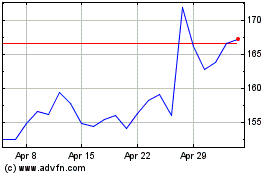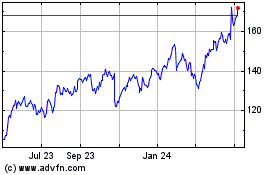By Vipal Monga and Rob Copeland
This article is being republished as part of our daily
reproduction of WSJ.com articles that also appeared in the U.S.
print edition of The Wall Street Journal (May 8, 2020).
Google's parent abandoned plans to develop a "smart city" in a
Toronto neighborhood, a controversial project that once embodied
the tech giant's futuristic ambitions.
The move is the highest-profile example yet of retrenchment by
Alphabet Inc. under new Chief Executive Sundar Pichai. The Toronto
project, under Alphabet arm Sidewalk Labs, was a favorite of Google
co-founder Larry Page, who held the CEO role until December.
Sidewalk Labs cited economic uncertainty and pressure on the
local real-estate market in the wake of the coronavirus pandemic. A
person familiar with the decision said cost was another major
factor. Alphabet had poured hundreds of millions of dollars into
Sidewalk, with most of that earmarked for the Toronto project, and
yet had little to show for it.
Alphabet Chief Financial Officer Ruth Porat was pushing to curb
the initiative even before coronavirus hit, the person said.
A Sidewalk spokeswoman said, "This was a decision made by
Sidewalk Labs. We spent a great deal of time deliberating and came
to the conclusion that it no longer made sense to proceed with the
project. We informed Alphabet on Tuesday, and Waterfront Toronto
yesterday."
Sidewalk was selected by Canadian government entity Waterfront
Toronto as the development partner in 2017, in a bid to build a
neighborhood on a 12-acre parcel of land along Toronto's
waterfront. The plan envisioned an energy-efficient friendly
neighborhood where sensors embedded in traffic lights and garbage
bins tracked residents and responded to their needs.
The project, initially championed by Canadian Prime Minister
Justin Trudeau, quickly ran into local opposition. Activists said
they were concerned how the company would handle personal data, and
that Google's algorithms would take too much control over city
planning.
"Sometimes it's easier not to be Google when going after bold
ideas," said Sidewalk founder Adrian Aoun, who left the company in
2016.
The project was one of the highest profile developments in
Toronto, though Sidewalk had not yet received final approval and
had not built anything on the site.
"This is not the outcome we had hoped for," said Waterfront
Toronto chairman Stephen Diamond. He said the board would continue
to seek input on developing the project.
Meanwhile, opponents of the development, including Jim
Balsillie, former co-CEO of BlackBerry Ltd., cheered.
"This is a major victory for the responsible citizens who fought
to protect Canada's democracy, civil and digital rights," he said.
"Sidewalk Toronto will go down in history as one of the more
disturbing planned experiments in surveillance capitalism."
Mr. Page's departure from Alphabet's management late last year
also likely weakened support for a project that wasn't economic,
said Will Fleissig, the former CEO of Waterfront Toronto, who
brought Sidewalk in to bid for the development. "It becomes a
business transaction issue, as opposed to an aspirational project,"
he said.
Google has said it is cracking down on costs, particularly those
outside of its core search and advertising units, amid economic
uncertainty. Sidewalk is part of an Alphabet subsidiary, "Other
Bets," which reported $1.1 billion in losses in the most-recent
quarter.
Alphabet earned an operating profit of $8 billion, but warned of
a "tale of two quarters" as the pandemic's effects were felt in
March.
Mr. Pichai recently told staff that the company's breakneck pace
of hiring would slow for the remainder of the year, a major change
given Google's tradition of consistently expanding into new
areas.
Though it was delayed by opposition and fears that the company
was overreaching with proposals that went beyond its initial
project, the board of Waterfront Toronto last year agreed to
continue negotiations over a final agreement, with a decision
expected to come in June.
The Toronto waterfront development was Sidewalk's biggest
project since Dan Doctoroff helped launch the business in 2015. He
was previously a deputy mayor for economic development in New York
City and was later chief executive of Bloomberg LP.
"It has become too difficult to make the 12-acre project
financially viable without sacrificing core parts of the plan we
had developed together with Waterfront Toronto to build a truly
inclusive, sustainable community," Mr. Doctoroff said.
Alphabet, for its part, still has plans to grow in Canada. The
company announced in February plans to build new offices in
Montreal, Toronto and Waterloo, and hasn't changed its expansion
plans, said a spokeswoman.
--Jacquie McNish contributed to this article.
Write to Vipal Monga at vipal.monga@wsj.com and Rob Copeland at
rob.copeland@wsj.com
(END) Dow Jones Newswires
May 08, 2020 02:47 ET (06:47 GMT)
Copyright (c) 2020 Dow Jones & Company, Inc.
Alphabet (NASDAQ:GOOGL)
Historical Stock Chart
From Mar 2024 to Apr 2024

Alphabet (NASDAQ:GOOGL)
Historical Stock Chart
From Apr 2023 to Apr 2024
